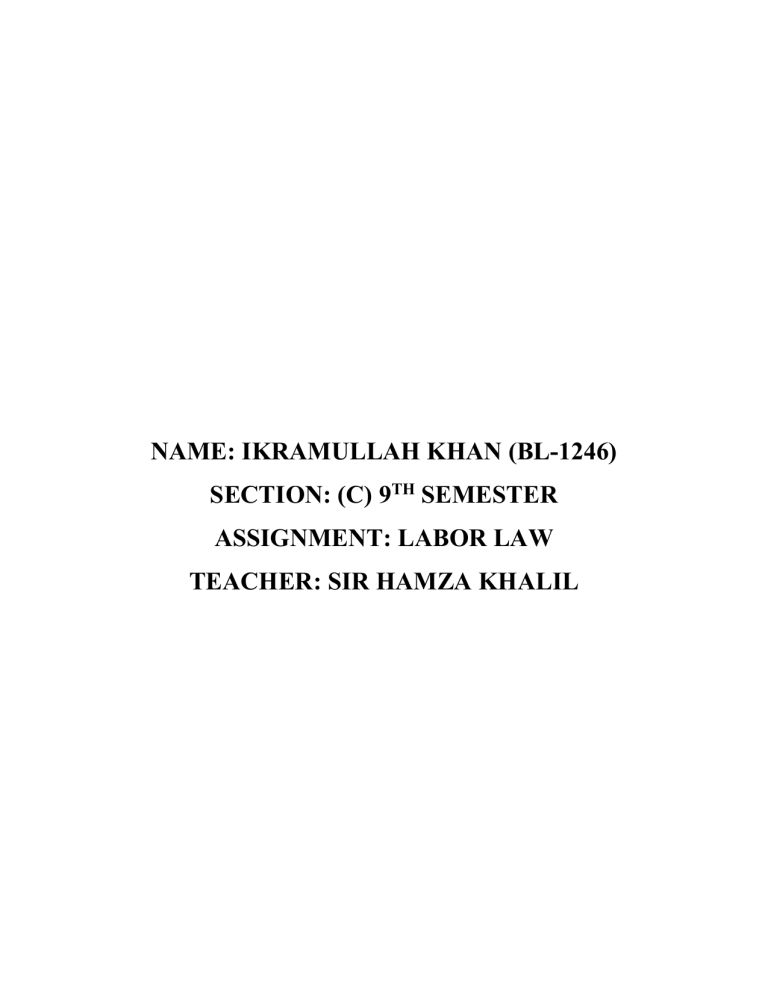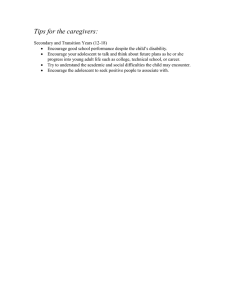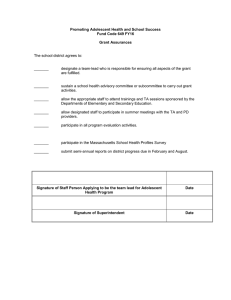
NAME: IKRAMULLAH KHAN (BL-1246) SECTION: (C) 9TH SEMESTER ASSIGNMENT: LABOR LAW TEACHER: SIR HAMZA KHALIL THE SINDH PROHIBITION OF EMPLOYMENT OF CHILDREN ACT, 2017. SINDH ACT NO. III OF 2017. SUMMARY The purpose of this law is to forbid the employment of minors and to control the employment of adolescents in specific jobs and occupations. This Act may be called the Sindh Prohibition of Employment of Children Act, 2017 and it extends or apply to the whole of the Province of Sindh. Prohibition of employment and Amendment of Schedule. (SECTION 3 &4) The section 3 and 4 states that no any child shall be employed or allowed to work in any establishment or no any adolescent may be employed or given permission to perform any hazardous work listed in the Schedule. But here in the section 4 there is an extra thing that the concerned Government may occasionally alter the Schedule by publishing a notification in the Official Gazette, in that case, the Schedule will be assumed to have been amended three months following the publication date of the notification. Provincial Coordination Committee on Child Labor. (SECTION 5) This section states that there should be a provincial coordination committee on child labor consist of a Chairperson and not less than nine other members representing government, employers, workers, civil society and two Members of the Provincial Assembly of Sindh nominated by the Speaker Provincial Assembly of Sindh which recommends the government suitable legislative, administrative, and other mechanisms for the eradication of child labor in accordance with international standards and to establish the minimum age for employment in the Province. Hours and period of work (SECTION 7) This section describes that no adolescent shall be required or allowed to work more hours than those that may be set by that establishment or class of establishments. also describes that adolescent shall work for three hours with at least a one-hour break, and the length of each workday shall be adjusted so that no period shall exceed three hours. Adolescents' workdays must be planned as such, they do not last longer than seven hours per day, counting the time spent waiting to start. There is also an exception that adolescent cannot be compelled to do work between 7 and 8 and also prohibited overtime. If he has done work in other establishment, he cannot be required to do work for any other establishment. Weekly Holidays. (SECTION 8) This section states that every adolescent working in an establishment is entitled to one full day off per week. This day must be specified by the occupier in a notice that is permanently displayed in a prominent location inside the establishment, and the occupier may not change the day specified more than once every three months. Notice to Inspector and Disputes as to age. (SECTION 9 & 10) These sections states that every occupier of an establishment where an adolescent was employed or given permission to work must send a written notice containing the following information to the inspector whose local limits the establishment is located: (a) the name, location, and address of the establishment; (b) the name of the person actually in charge of the establishment; (c) the address to which grievances regarding the establishment should be sent; (d) nature of work or occupation. And the section 10 clearly explains that if the dispute arises regarding the age of child or adolescent it will be solved by the medical certificate and the certificate is not present then it will be reported to inspector then such inspector can contact the particular medical officer. Maintenance of register (SECTION 11). This section states that every occupier is required to keep a register of all adolescents who are employed or permitted to work in any establishment, which must always be open to inspection by an inspector during working hours. The register must include the following information: (a) the name and birthdate of each adolescent; (b) the hours and periods of work of each adolescent: (c) the nature of each adolescent's work; and (d) the intervals of rest to which each minor is entitled. Display of notice containing abstract of Section 3 and 14. (SECTION 12) This section puts light that each occupier is required to have a notice in Sindhi, Urdu, and English with an abstract of Sections 3 and 14 displayed in a visible and accessible location. Penalties. This section states that anyone who violates the terms of subsection 3 (1) by hiring any child is subject to a term of imprisonment that may not exceed six months, a fine that may not exceed 50,000 rupees, or both: If the child is working in any dangerous work, the fine cannot be less than 10,000 rupees and the maximum term of imprisonment cannot be longer than three years. Furthermore, if the child or adolescent is employed in any of the following: (a) any form of slavery or a practice closely related to slavery, such as the sale or trafficking of children or adolescents, debt bondage or serfdom, or forced or mandatory labor, including the forced or mandatory recruitment of children or adolescents for use in armed conflicts; (b) the use, procurement, or offering of a child or adolescent for prostitution, the creation of pornography, the use, procurement, or offering of a child or adolescent for illegal activities, particularly for the manufacturing and trafficking of drugs; the maximum fine is ten lakh rupees, but it cannot be less than two hundred thousand, and the maximum sentence is ten years in jail, but not less than five. (2) A person who engages in hiring or permitting the employment of a minor in violation of subsection (3)(2) is subject to a term of imprisonment that may not exceed one year, a fine that may not exceed seventy-five thousand rupees, or both. (3) Anyone who commits a similar offence after being found guilty of one under Section 3 is subject to imprisonment for a term which shall not be less than one year but which may extend to fifteen years. Whoever violates any of the following provisions of this Act or the rules made thereunder will be subject to simple imprisonment that may last up to one month or a fine that may reach ten thousand rupees: (a) failing to give notice as required by section 9; (b) failing to maintain a register as required by section 11 or making any false entries in any such register; (c) failing to produce records for inspection; (d) failing to display a notice; or (e) failing to comply with or breaking any of the provisions. Abetment to an offence and Procedure relating to offences. These sections explain that regardless of whether the offence they helped to facilitate is really carried out, anybody who helps an offence that is punished under this Act will face the same punishment that is imposed on the offence that they helped to facilitate. A complaint of a violation of this Act may be made in any court with jurisdiction over the matter by any individual, police officer, or labor inspector. For the purposes of this Act, any adolescent's age certification issued by a recognized medical authority shall serve as conclusive proof of the adolescent's age. Appointment of Inspectors and Power to make rules. These sections state that for the purpose of ensuring compliance with any or all of the requirements of this Act within specific locations, the government may appoint and notify inspectors. Any inspector so appointed and notified will be regarded to be a public servant within the meaning of the Pakistan Penal Code. Rules for implementing this Act's provisions may be made by the government, subject to the requirement of prior publication, and by notification in the Official Gazette. Power to remove difficulties and Protection against discrimination. These sections describe that if there is any difficulty in carrying out the provisions of this Act, the Government may, by order published in the official Gazette, enact any provisions that are not in conflict with those provisions that it deems necessary or expedient to remove the difficulty: Provided, however, that no such order shall be made after the passing of two years after the date on which this Act receives the Governor's assent. Every order made under to this section shall be brought before the Provincial Assembly as soon as is reasonably possible after it is made. Regarding the consideration and resolution of matters pertaining to the implementation of this Act, no discrimination shall be made on the basis of gender, religion, political affiliation, sect, caste, creed, or ethnic background. Responsibility of the occupier towards education of child or adolescent. This section states that in order to comply with Article 25A of the Islamic Republic of Pakistan's Constitution, the occupier of the institution where a child (under 16 years old) is employed or learning a trade must make sure that the minor or kid is enrolled in obligatory schooling. The occupier is required to retain documentation of the child's or adolescent's education on hand for the inspection of the appropriate inspecting authority.



